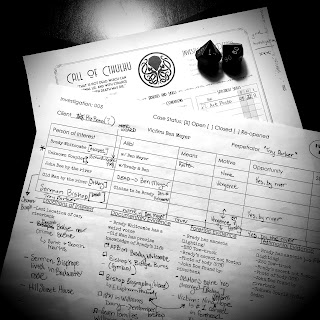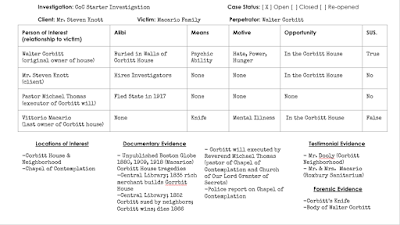 |
| A campaign big on torches, less on tommy-guns |
My ideal Call of Cthulhu game would consist of the following materials:
Copy of Cthulhu Dark, which is a small 3d6 dice pool system
A Sears Roebuck catalog from the 1920's as the "player's handbook"
A campaign structured around Sean McCoy's investigation sheet like here
A map of CoC's Arkham City, which really can be Anywhere Town, US Anywhere
Investigators Are Everyday Outsiders: Pull out an index card and write your name and profession, which can't be a part of any established power center like the police, city hall, military, or even university faculty (could be new professor or pushed aside faculty). I’d even exclude “big” criminal backgrounds because they themselves are enforcers of (inverted) power structures. Ideally, its professions that push boundaries or study obscure corners or exist in the cracks of power structures. You can’t be anyone important.
In terms of investigations, I think Sean McCoy’s investigation sheet is the bee’s knees when it comes to empowering the player to actually be fully invested into the mystery of the world. This stands in a little bit of contrast to the official CoC publications as well as Cthuhlu Dark’s own philosophy via Stealing Cthulhu. Both sources frame their campaigns more as revelations that true “whodunits”.
No to Sanity Mechanics, Yes to"Cassandra Effects": Basically, do away with "insanity" because the investigators aren't insane- ever. There really are evil fish-people, they did see star-vampires, and reality-eating colors totally ate that guy. There is nothing to cure because they are not suffering from any delusions. NPCs can go "insane," but players always maintain agency, but are thwarted by non-believers.
Instead, it will be up to the investigators to explain to the humans around them what the hell they exactly were doing when the local Presbyterian church blew up with Mann Co.'s suspiciously missing dynamite. This crime-suspicion-alibi structure will also reinforce the campaign's framework. Players will have to avoid their investigators becoming the prime suspect in their own investigations!
Cthulhu Dark's Insanity Die becomes the "You're Crazy" Die: Okay, so here's how the dice work in Cthulhu Dark:
[Roll 1 or more of your dice] [t]hen your highest die shows how well you do. On a 1, you barely succeed. One die if the task is within human capabilities. One die if it’s within your occupational expertise. Your Insanity die, if you will risk your sanity to succeed.On a 6, you do brilliantly. Your Insanity die, if you will risk your sanity to succeed
Mechanically, this means different institutions/NPCs have varying levels of tolerance on this scale. For instance, Joe's Soda Shoppe might stop letting you in if your score is 2, meanwhile the local speakeasy, Diamonds, will keep letting you in if up to a score of 4.
Arkham Library is closed off to you at a score of 3, while Ms. Terry the local, supposed, medium and fortune-teller to the ladies of Arkham might still let you come by if your score is 5. She, too, knows what's up in Arkham. Cults, the real ones, are always ready to welcome new congregants, but you can't be less than a 5.
The Terminator & Cosmic Horror: Or The Slow Train Wreck You Can’t Stop: It will be up to the GM to continuously press on the tension between the reality the players know and the illusion of normalcy the NPCs maintain. And, to spell it out, this always includes the press of law and government, who keep the peace and enforce the law. The horror here is knowing the absolute truth with a big "T" and being almost powerless to stop it and in fact thwarted by the institutions who could do something about it. Not so much a jump-scare by tentacles.
With this framing, Sarah Connor in Terminator is the perfect Lovecraftian protagonist. She is a waitress in LA who meets a drifter claiming to be from the future sent back to protect her from a murderous robot sent from the same future by a machine intelligence so powerful it invented time travel to kill her before she births the child who will stop it from destroying humanity. Sarah (and the audience) knows this to be true, but part of the horror of Terminator, besides being hunted by an unstoppable killer robot, would be trying to convince others of this truth. No one would believe you, you might even hardly believe you. By Terminator 2, she is put in an asylum and has her child taken away for being “crazy”. But again, she’s not! Its all true.
For instance, players might have a victim, motive, location, but 3 different suspects, all with not entirely air-tight alibis. A speak with dead spell could fix the issue because you can merely ask the victim who killed them. But now you have to exhume the body or break into the morgue. A small crime in the greater context. But then if you know the perpetrator, how do you legally bring them to justice, given you don’t have admissible evidence? Maybe you take the law into your own hands. After all you know the truth and that is what matters right? Again this puts characters back at odds with the “polite” society around them.
My goal here is not to turn our investigators or the game into some 90’s grimdark Frank Miller Batman, but instead have players themselves experience somewhat the same temptation of magic NPCs feel. And also have things only get more complicated from there. Which, while maybe not a direct reflect of CoC source material, does put this game and magic in contrast to fantasy adventure games– magic is dangerous not because it causes insanity, but because it allows you to act in anti-social ways. Its continual use naturally drives you away from normalcy.
Specifically for the players, this means using a rules-lite systems to find a solution (not necessary “solve”) a logic set-up that structures a crime/mystery with natural and super-natural elements using whatever is in the fictional environment: libraries, NPCs connections, skills reasonably linked to chosen profession, and anything else in the Sears cataloge. So there you have it, my ideal “CoC” campaign.








